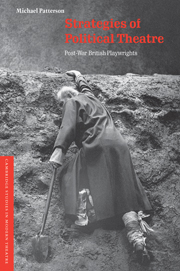Book contents
- Frontmatter
- Contents
- Acknowledgments
- Brief chronology, 1953–1989
- Introduction
- Part 1 Theory
- Part 2 Two model strategies
- Part 3 The reflectionist strain
- Part 4 The interventionist strain
- 7 Agit-prop revisited: John McGrath's The Cheviot, the Stag and the Black, Black Oil (1973)
- 8 Brecht revisited: David Hare's Fanshen (1975)
- 9 Rewriting Shakespeare: Edward Bond's Lear (1971)
- 10 The strategy of play: Caryl Churchill's Cloud Nine (1979)
- Conclusion
- Notes
- Select bibliography
- Index
9 - Rewriting Shakespeare: Edward Bond's Lear (1971)
Published online by Cambridge University Press: 22 September 2009
- Frontmatter
- Contents
- Acknowledgments
- Brief chronology, 1953–1989
- Introduction
- Part 1 Theory
- Part 2 Two model strategies
- Part 3 The reflectionist strain
- Part 4 The interventionist strain
- 7 Agit-prop revisited: John McGrath's The Cheviot, the Stag and the Black, Black Oil (1973)
- 8 Brecht revisited: David Hare's Fanshen (1975)
- 9 Rewriting Shakespeare: Edward Bond's Lear (1971)
- 10 The strategy of play: Caryl Churchill's Cloud Nine (1979)
- Conclusion
- Notes
- Select bibliography
- Index
Summary
Critics annoy me. If a house is on fire and I shout ‘Fire ! Fire !’ I don't want people to commend my shouting ability, I want them to join in the firefighting.
Edward Bond calls his brand of playwriting ‘Rational Theatre’. More than any other contemporary British political dramatist, in fact more than any English-language dramatist since Shaw, Bond has theorized about his work and its intentions, about society and its problems, in numerous prefaces, interviews, essays and letters.
The focus of his concern is human suffering, especially the violence perpetrated by man against man. The argument runs as follows: we live in a world characterized by violent aggression, but humankind is not naturally aggressive. The aggression stems from the unnatural conditions in which an exploitative society forces us to live:
We have a capacity for violence and, like many animals, are violent when we are afraid or frustrated. This is as natural as when a drowning man fights for his life. But it is not natural for him to keep falling in the water … Violence is like pain, not a normal condition but a sign that something is wrong.
We are like caged animals, but, instead of turning on our keepers, we fawn on them because they bring us sufficient food; so we vent our frustration and animosity on our fellow captives.
- Type
- Chapter
- Information
- Strategies of Political TheatrePost-War British Playwrights, pp. 138 - 153Publisher: Cambridge University PressPrint publication year: 2003



